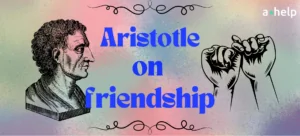Aristotle’s concept of the ‘golden mean’ offers a timeless guide to living well, advocating for a balanced approach between extremes. Imagine you’re trying to balance on a seesaw. If you go too far to one side, you’ll fall off, and the same happens if you go too far to the other side. Aristotle believed that the best way to live and act is to find that perfect spot in the middle where things are balanced.

✅ AI Essay Writer ✅ AI Detector ✅ Plagchecker ✅ Paraphraser
✅ Summarizer ✅ Citation Generator
Aristotle’s Golden Mean: A Guide for Making Decisions
Aristotle’s notion of the ‘golden mean’ stands as a cornerstone in ethical philosophy, advocating for a balanced path between excess and deficiency.
His philosophy, rooted in the pursuit of eudaimonia—happiness or flourishing—suggests that excellence in life is achieved through rational moderation. Aristotle’s concept of the golden mean plays a special role in ethical decision-making. He proposes that virtues such as courage, honor, and justice are essentially forms of excellent rational activity, each lying between two extremes. For instance:
- Courage: Balances between cowardice (deficiency) and recklessness (excess).
- Confidence: Strikes a mean between self-deprecation (deficiency) and arrogance (excess).
- Generosity: Finds its place between stinginess (deficiency) and wastefulness (excess).
These virtues, according to Aristotle, are not rigidly centered between extremes but instead, align with the ‘golden mean’—a relative position determined by rational consideration and practical wisdom. This ideal, as the philosopher articulates in his “Nicomachean Ethics,” rises from choices made rightly, about the right matters, and in the right manner, reflecting the best condition of virtue.
Excellence Isn’t Ingrained, but Learnable
Aristotle asserts that excellence, similar to skills like playing an instrument, is acquired through practice. Virtues are developed by engaging in social interactions and confronting various situations. For example, fairness is learned through just dealings, and courage through managing fear and confidence in challenging scenarios.
It is by taking part in transactions with our fellow men that some of us become fair-minded and others iniquitous; by acting in dangerous situations and forming a habit of fear or of confidence we become courageous or cowardly.
This concept illustrates the importance of habitual practice in ethical behavior. Aristotle encourages stepping into the world and striving to identify the golden mean in every action. He acknowledges the fluidity of life, where the right action varies with circumstances and individual differences. Thus, living a flourishing life hinges not on inherent goodness but on consistently using reason to handle life’s diverse contexts.
Tips for Identifying the ‘Golden Mean’
Aristotle offers practical advice for discovering the golden mean in everyday actions. One key strategy involves self-awareness and counterbalancing one’s natural tendencies. For instance:
If prone to anger, one should consciously aim for calmness, not because never being angry is virtuous, but to find a balanced response between undue anger and total passivity.
Aristotle compares this approach to a carpenter straightening warped wood. By understanding and adjusting our natural inclinations, we can move towards a more balanced and virtuous middle path.
Based on the concepts we looked at, Aristotle’s golden mean seems basically to be a practical guide to living. It teaches us that virtues are not inherent traits but skills acquired through mindful practice and rational decision-making. By striving for balance in our actions and reactions, we move closer to Aristotle’s ideal of a flourishing life, marked by happiness and rational excellence.
FAQ
Follow us on Reddit for more insights and updates.





Comments (0)
Welcome to A*Help comments!
We’re all about debate and discussion at A*Help.
We value the diverse opinions of users, so you may find points of view that you don’t agree with. And that’s cool. However, there are certain things we’re not OK with: attempts to manipulate our data in any way, for example, or the posting of discriminative, offensive, hateful, or disparaging material.